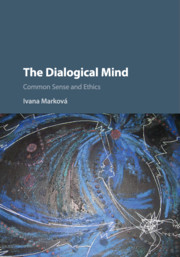Book contents
- The Dialogical Mind
- The Dialogical Mind
- Copyright page
- Dedication
- Epigraph
- Contents
- Figures
- Preface and acknowledgements
- Introduction
- Part I ‘Superior’ and ‘inferior’ thinking and knowing
- 1 From mythos and irrationality towards logos and rationality
- 2 Towards Giambattista Vico’s common sense
- 3 Common sense in humanities and social sciences
- Conclusion to Part I
- Part II Dialogicality as epistemology of daily life and of professional practices
- References
- Index
2 - Towards Giambattista Vico’s common sense
from Part I - ‘Superior’ and ‘inferior’ thinking and knowing
Published online by Cambridge University Press: 05 August 2016
- The Dialogical Mind
- The Dialogical Mind
- Copyright page
- Dedication
- Epigraph
- Contents
- Figures
- Preface and acknowledgements
- Introduction
- Part I ‘Superior’ and ‘inferior’ thinking and knowing
- 1 From mythos and irrationality towards logos and rationality
- 2 Towards Giambattista Vico’s common sense
- 3 Common sense in humanities and social sciences
- Conclusion to Part I
- Part II Dialogicality as epistemology of daily life and of professional practices
- References
- Index
Summary
This chapter traces historical roots of common sense from Aristotle, and through the scientific revolution of the sixteenth and seventeenth centuries. Ideas associated with the scientific revolution gave rise to new perspectives in arts, artisanships and technology, all these influencing the emergence of social sciences. The chapter focuses on the work of the Italian scholar Giambattista Vico who, in many respects, can be viewed as a precursor of the idea of the dialogical mind although Tagliacozzo emphasizes that Vico’s ideas had no influence until the nineteenth century. If we find traces of Vico’s ideas in the creators of the dialogical mind ranging from Herder, Hamann, Humboldt through to Cassirer, Bakhtin and Moscovici among others, this shows the originality and foresight of Vico’s oeuvre as a whole. Already in the early eighteenth century he viewed natural and human sciences as being of different kinds. For Vico, human beings humanize nature by acting on it, by establishing communities, social institutions, traditions and political organizations. It is common sense that forms the basis of historicity. From his critique of the Cartesian method, Vico developed a modern conception of common sense based on verum factum, the logic of imagination, language and ethics.
Keywords
- Type
- Chapter
- Information
- The Dialogical MindCommon Sense and Ethics, pp. 39 - 61Publisher: Cambridge University PressPrint publication year: 2016

